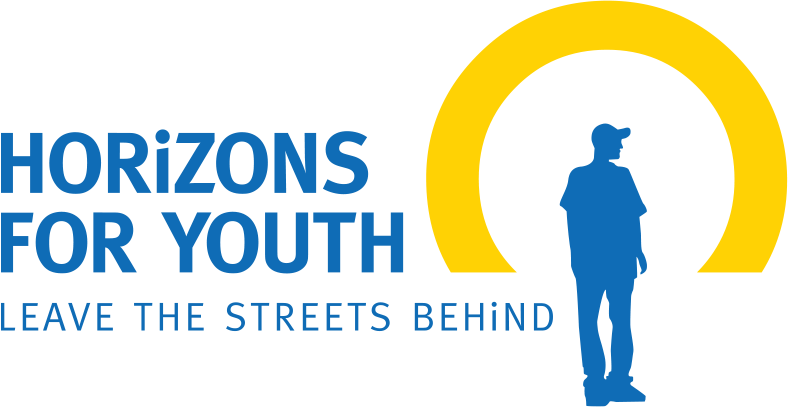Often when we think about youth experiencing homelessness, we assume that they do not have a family or that they are better off without their family. Approximately 60-70% of homeless youth in Canada have experienced physical, emotional, verbal or sexual abuse by their parents or caregivers (Gaetz et al., 2013). It is therefore presumed that the role of agencies that support at-risk youth, like Horizons for Youth, is to help homeless youth become self-sufficient and independent from their family. However, if ‘family’ is framed as a detriment to homeless youth, we may be dismissing some important individuals that can help youth transition out of homelessness (Winland, 2013).
It is not surprising that youth are more likely to thrive when they have a support system. Justin Sage-Passant, Project Coordinator of the Family & Natural Supports Program at Covenant House, explains that when at-risk youth have meaningful, supportive relationships, they generally have a more successful transition from adolescence to adulthood because they have a better sense of self and increased self-esteem.
The question to consider is, how do youth experiencing homelessness create and maintain these important bonds, and with who?
Sage-Passant understands family as any group of people that care about each other, regardless of biological or legal connection. An abusive mother, for example, may be excluded from a youth’s chosen family because a relationship with this individual threatens their safety and well-being. However, this youth may want to maintain relationships with their siblings or extended family members, or may consider a close group of friends their chosen family. In addition to biological family members or friends, youth can develop or enhance relationships with other natural supports like adults who are involved in a young person’s life, such as teachers, coaches or neighbours. Although many homeless youth have connections with professionals like social workers and doctors, natural supports tend to be more stable and long-lasting (Gaetz et al., 2018).
In recognition of the value in helping homeless youth enhance their support system, the Family & Natural Supports (FNS) Program launched in Toronto last year. The program is an official demonstration project of the Making the Shift Youth Homelessness Demonstration Lab, led by A Way Home Canada and the Canadian Observatory on Homelessness. The project is funded by the Government of Canada's Youth Employment and Skills Strategy. This program is a national strategy to prevent youth homelessness and to help youth find housing stability quickly if they do become homeless. The longer youth remain homeless, the more likely they are to experience deteriorating mental and physical health, nutritional vulnerability, drop out of high school and become victims of crime (Gaetz et al., 2016). If we can prevent youth homelessness or help youth find housing quickly, the devastating effects of homelessness will reduce.
The FNS program has two main goals. The first is housing stabilization and this goal is met when a youth can exit the shelter quickly into supportive housing. The second is that youth report that they were able to strengthen relationships with natural supports after participating in the program. Sage-Passant explains that this program is intended to help reconcile relationships between youth and anyone in their chosen family, and navigate these difficult relationships in safe and healthy ways. Since this program launched on August 1, 2018, 29% of the 109 youth involved have transitioned to stable housing and 71% of youth say they have improved relationships with natural supports.
The FNS Program is offered at Horizons for Youth and other organizations supporting at-risk youth in Toronto. FNS Workers can provide homeless youth and their families with counselling and referrals to supportive community services. At Horizons for Youth, Travis Major, Horizons for Youth’s FNS Worker, leads a one-hour workshop every Wednesday to start a conversation about family and relationships. Through these workshops, he also introduces himself to the residents and starts to build trusting relationships with them. Following the workshop, he meets one-on-one with interested youth and provides family counselling. Some youth come to him with a clear family goal, such as “I want to fix my relationship with my mom.” For others, they may be looking for support getting closure if they know a certain relationship in their life has to end. If youth are really isolated, he offers support in helping youth develop meaningful relationships. To do so, he may suggest enrolling in school, going to certain community programs or reconnecting with extended family members. Travis says that having a broad range of natural supports provides youth with long-term stability because their family will be able to support youth long after they leave the shelter or stop using various social service agencies.
A key element of this program is learning tools to communicate effectively and understanding how conflict escalates when there is a breakdown in communication. For instance, Travis says a common issue he sees in working with our clients is a lack of understanding of mental health challenges among parents and caregivers. Consequently, some parents only observe ‘difficult’ behaviours, without understanding the causes of these behaviours. For example, a youth experiencing depression may have a hard time attending school, doing homework or going to work. Through counselling, Travis can help caregivers understand the symptoms of their child’s mental health challenge and how they can better support their child. He can also work with the youth to help them recognize that their parents were not trying to be cruel, they just did not understand and they are now taking steps to be more supportive. Sage-Passant contends that ‘re-framing conflict’ and learning to see conflict from alternative perspectives is a critical element of family counselling.
The FNS program was a natural partnership for Horizons for Youth as it builds on the work our agency was already doing to support youth with family reconciliation and relationship development. Horizons for Youth offers a Community Support & Aftercare Program that assists youth in their transition out of the shelter system by educating them about various supportive resources and providing informal counselling as youth integrate into their respective communities. Before Horizons for Youth offered the Community Support & Aftercare Program, we realized that many youth unfortunately re-entered the shelter system a few months after leaving because they lacked a support system. We designed the Community Support & Aftercare Program to address this challenge. The FNS program at Horizons for Youth provides enhanced support to this work and moreover, FNS workers are able to assist youth after they ‘age out’ of the youth shelter system at 25.
All meaningful family relationships require work, compassion and understanding. Due to the instability of homelessness, many homeless youth struggle to maintain or create these relationships, but they are important for positive youth development. The FNS Program, therefore, is a critical part of Horizons for Youth’s work to help youth escape from the cycles of homelessness and poverty.
Written by Stacey Murie
References:
Gaetz, S., O’Grady, B., Kidd, S., Schwan, K. (2016). Without a Home: The National Youth Homelessness Survey. Toronto: Canadian Observatory on Homelessness Press
Gaetz, S., O’Grady, B., Buccieri, J. Karabanow, J., & Marsolais, A. (2013). Reconnecting with Family and Community: Pathways Out of Youth Homelessness. In S. Gaetz, B. O’Grady, K. Buccieri, J. Karabanow & A. Marsolais (Eds.), Youth Homelessness in Canada: Implications for Policy and Practice (pp 15-38). Toronto: Canadian Observatory on Homelessness Press.
Gaetz, S., Schwan, K., Redman, M., French, D., & Dej, E. (2018). Report 3: Early Intervention to Prevent Youth Homelessness. A. Buchnea (Ed.). Toronto, ON: Canadian Observatory on Homelessness Press.
Winland, D. (2013). Reconnecting with Family and Community: Pathways Out of Youth Homelessness. In S. Gaetz, B. O’Grady, K. Buccieri, J. Karabanow & A. Marsolais (Eds.), Youth Homelessness in Canada: Implications for Policy and Practice (pp 15-38). Toronto: Canadian Observatory on Homelessness Press.

